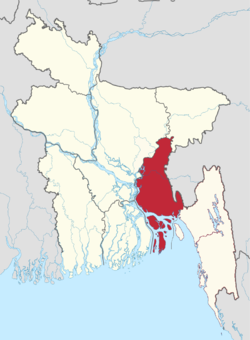Comilla Division
|
Comilla Division কুমিল্লা বিভাগ সমতট (Samatata) Roshnabad |
|
|---|---|
| Proposed Division | |
 Comilla Division in Bangladesh |
|
| Country |
|
| Capital | Comilla |
| Area | |
| • Total | 12,848.53 km2 (4,960.85 sq mi) |
| Population (2011 census) | |
| • Total | 16,708,000 |
| • Density | 1,300/km2 (3,400/sq mi) |
| Time zone | BST (UTC+6) |
| ISO 3166 code | BD-B |
| Main Language(s) | Bengali |
| Other languages | English |
| Districts | 6 |
| upazilas | 59 |
Comilla Division (Bengali: কুমিল্লা বিভাগ) is a proposed administrative division within Bangladesh for the northern parts of the existing Chittagong Division, comprising Brahmanbaria, Comilla, Chandpur, Noakhali, Feni, and Lakshmipur Districts of Chittagong Division. The proposed Comilla Division was one of 21 former regions of Bangladesh, which formed an additional administrative level between the levels of the divisions and the districts. It covers the south-easternmost areas of the country, with a total area of 12,848.53 km2 (4,960.85 sq mi) and a population at the 2011 census of 16,708,000.
The Greater Comilla region was once under ancient Kingdom of Samatata and was joined with Tripuri Kingdom. Lalmai Mainamati was ruled by Deva dynasty (eighth century AD), and (during tenth and mid-eleventh century AD). In 1732, it became the center of the Bengal-backed domain of Jagat Manikya.
The Peasants Movement against the king of Tripura in 1764, which originally formed under the leadership of Shamsher Gazi is a notable historical event in Comilla. It came under the rule of East India Company in 1765 and was established as Tippera district (also known as Chakla (administrative division) Roshnabad) in 1790. Later, it was reorganized in three phases into six districts.
The Division will be subdivided into six districts (zilas) and thence into 59 sub-districts (upazilas). The six districts listed below comprise the north-western portion (37.6%) of the present Chittagong Division, while the remaining five districts (zilas) comprise the south-eastern portion (62.4%) being separated by the lower (or Bangladeshi) stretch of the Feni River.
...
Wikipedia
